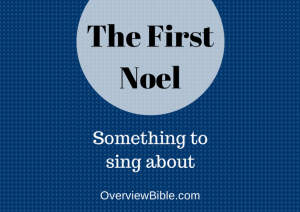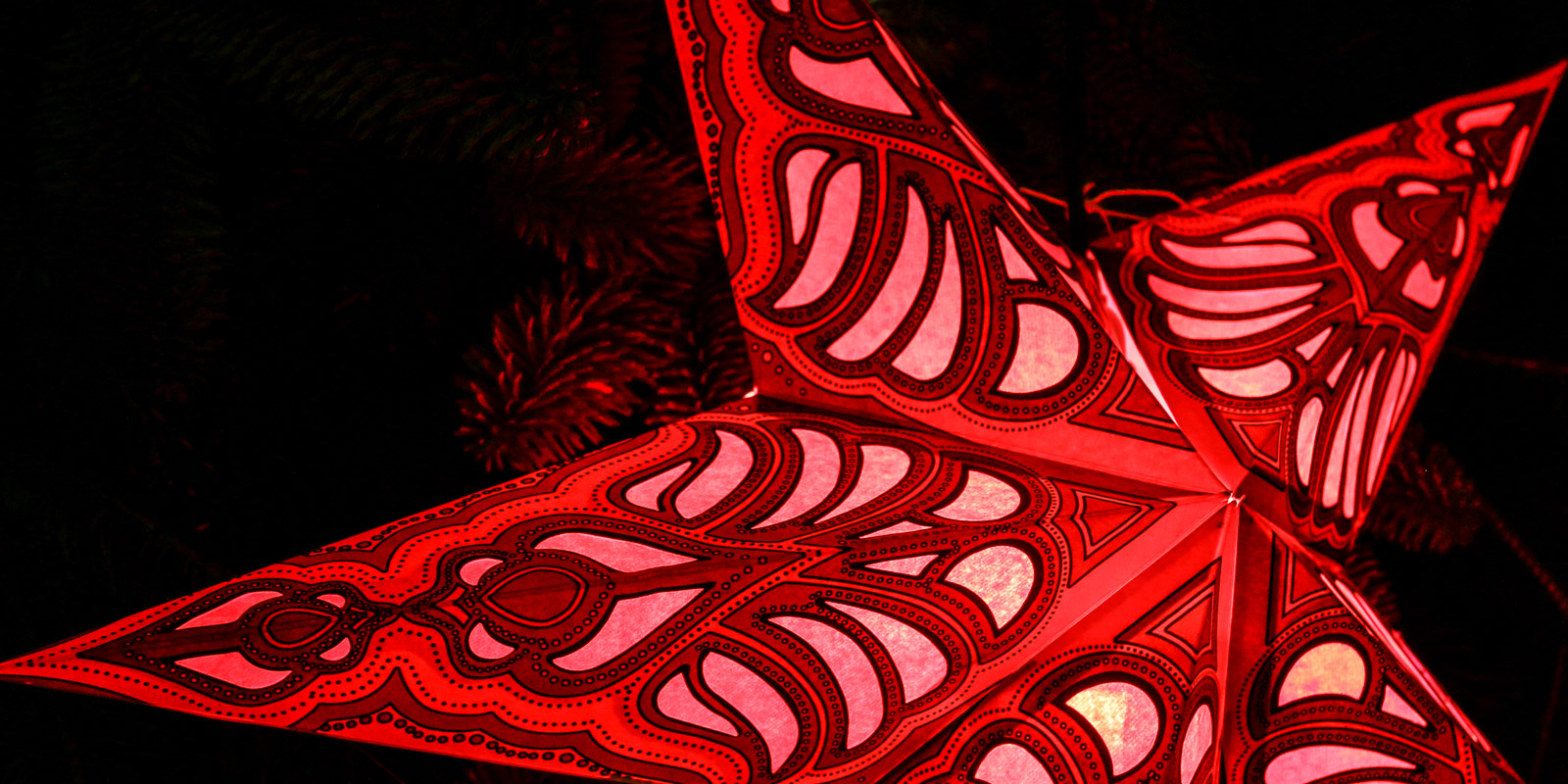“The First Noel” is a tune that showed up in the 1800s (possibly earlier). I loved this melody as a kid, but after comparing the lyrics to the Bible, I like it a lot more now.
It’s one of those songs that we sing every year, but it’s centered around a word we almost never encounter outside the lyrics. So before we jump into the lyrics of this hymn, let’s make sure we’re clear on what “Noel” means.
“Noel” is a French word that can refer to Christmas carols and the Christmas season. That makes “The First Noel” a noel about Noel.
Here we go . . .
The First Noel: do the lyrics fit the Bible?
The first Noel, the angels did say,
Was to certain poor shepherds in fields as they lay;
In fields where they lay, keeping their sheep,
On a cold winter’s night that was so deep:
The angels did indeed announce the birth of Jesus Christ to shepherds (Lk 2:8–9).
The shepherds were watching flocks by night (Lk :8), but it’s doubtful that this took place in the wintertime. If Caesar Augustus were to take a census of the inhabited earth (Lk 2:1–3), it is unlikely that he would have enforced travel on his citizens during the harshest of months.
Noel, Noel, Noel, Noel,
Born is the King of Israel.
The angels did proclaim that there had been born a “Savior, who is Christ the Lord” (Lk 2:11). To the Jews, the “Christ” or “Messiah” was the coming King, the promised one who would restore the throne of David. “Born is the King of Israel” certainly rings true, both then and now.
However, the angels make no reference to “Noel,” or “Christmastime,” which makes sense. After all, we didn’t come up with these terms or this holiday until long after Jesus had ascended.
They lookèd up and saw a star,
Shining in the east, beyond them far:
And to the earth it gave great light,
And so it continued both day and night.
We can assume that “they” in this verse refers to the shepherds, but we don’t have any record of them seeing any particular star.
We don’t know that the Star of Bethlehem was especially bright, nor that it shone 24 hours per day. In fact, the Magi passage in Matthew indicates that it wasn’t always so readily visible (Mt 2:10).
And by the light of that same star,
Three Wise Men came from country far;
To seek for a King was their intent,
And to follow the star wheresoever it went.
We don’t know how many wise men (Magi) “came from country far.” It could have been two, three, or three hundred. Learn more about the wise men here.
Seeking the newborn King of the Jews was indeed their quest. Before they arrived in Bethlehem, they asked Herod, “Where is He who has been born King of the Jews? For we saw His star in the east and have come to worship Him” (Mt 2:2.)
This star drew nigh to the northwest;
O’er Bethlehem it took its rest;
And there it did both stop and stay
Right over the place where Jesus lay.
The star led the wise men from “the east” to Jerusalem, and then from there to Bethlehem. If the wise men were from modern-day Iran, there’s a chance they could have seen the star in the northwestern sky. Scripture doesn’t make it clear which part of the heavens it first appeared in.
As for the star stopping over the place Jesus was, that’s straight out of Matthew‘s Gospel (Mt 2:9).
Then entered in those Wise Men three,
Fell reverently upon their knee,
And offered there in his presence,
Their gold and myrrh and frankincense.
Aside from the number three, this is biblical: “After coming into the house they saw the Child with Mary His mother; and they fell to the ground and worshiped Him. Then, opening their treasures, they presented to Him gifts of gold, frankincense, and myrrh” (Mt 2:11).
These verses are OK. Plenty of biblical content, but a good amount of nonbiblical elaboration.
But this last verse is so dense with Christian teaching and application. I love it:
Then let us all with one accord
Sing praises to our heavenly Lord
That hath made heaven and earth of nought,
And with his blood mankind hath bought.
Paul tells the Colossians to “put on love, which is the perfect bond of unity,” and in the next breath encourages the church to sing with thankfulness to God (Col 3:14; 16). We should indeed join one another in singing praises to both our God and our heavenly Lord Jesus.
The apostles testify that Jesus created heaven and earth:
- “For by Him all things were created [. . .] all things have been created through Him and for Him.” —Paul, Col 1:16
- “All things came into being through Him, and apart from Him nothing came into being that has come into being.” —John, Jn 1:3
Peter passionately confirms that Jesus’ blood has redeemed us: “You were not redeemed with perishable things like silver or gold [. . .] but with precious blood, as of a lamb unblemished and spotless, the blood of Christ” (1 Pe 1:18–19).
“The First Noel” starts weak, but finishes strong
 When I started working through this hymn, I didn’t think I’d end up liking it. After all, it makes a load of nonscriptural claims at the beginning:
When I started working through this hymn, I didn’t think I’d end up liking it. After all, it makes a load of nonscriptural claims at the beginning:
- The time of year
- The nature of the star
- The star appearing to the shepherds
- The number of wise men
But that last verse got me. This old Christmas carol draws an unexpected conclusion from the story of the Christ’s birth. Because we serve one King who made us and died for us, we are to praise Him on one accord.
It’s a call to Church unity from centuries past, and that’s certainly something to sing about.






Jesus was not born in December. He was conceived in December. And born 9 months later. This is why it was not the middle of winter when the wise men followed the star of David. You can get a better understanding of the true meaning of God’s word with a deeper Bible study with Shepherds Chapel bible study.
You can do this on your podcast by typing in shepherds chapel.
On television.
On youtube.
Google shepherds chapel.com
May God continue to bless and keep you all.
NoEL
Paleo Hebrew is Fun.
ex. in Hebrew the leter N (Nun) signifies a sapling; meaning the offspring
the letter A(or E in our case both being the letter Alef) signifies an ox, meaning strength or fiirst
and the letter L signifies a shepherds staff, meaning to lead or teach
which brings us to the the word el (as in elohim) which is significant and commonly used for God
so one can assume that Noel is really NoEL, meaning, The Son of God, AKA AMeN.
for fun i’ll tell ou this one too.
AMeN is made up of the letters Alef, Mem and Nun.
We know what Alef and Nun mean from the the part above, but what of Mem??
Mem signifies water, and mem mean Mighty, many Chaos, and to come from( like water down a stream)
One can then set up the letters AMeN and see that it’s a praise to
“The First Mighty Seed” AMeN
“The Seed of God” NoEL
aka Jesus.
Look up in paleo hebrew the words Hallelujah, and Jesus.
*Pro tip Hallelujah is praising Our Great Teacher and He Is the One who lifted/destroyed the veil/curtain and gave us understanding*
Learning Paleo Hebrew will help…
I can offer nought for what His blood bought; all I can do is praise Him with my own noel.
BTW, I don’t think I’ve ever sang that last verse in my 62 years of Christmases. Thanks for educating me once again.
I like it–the best for last!